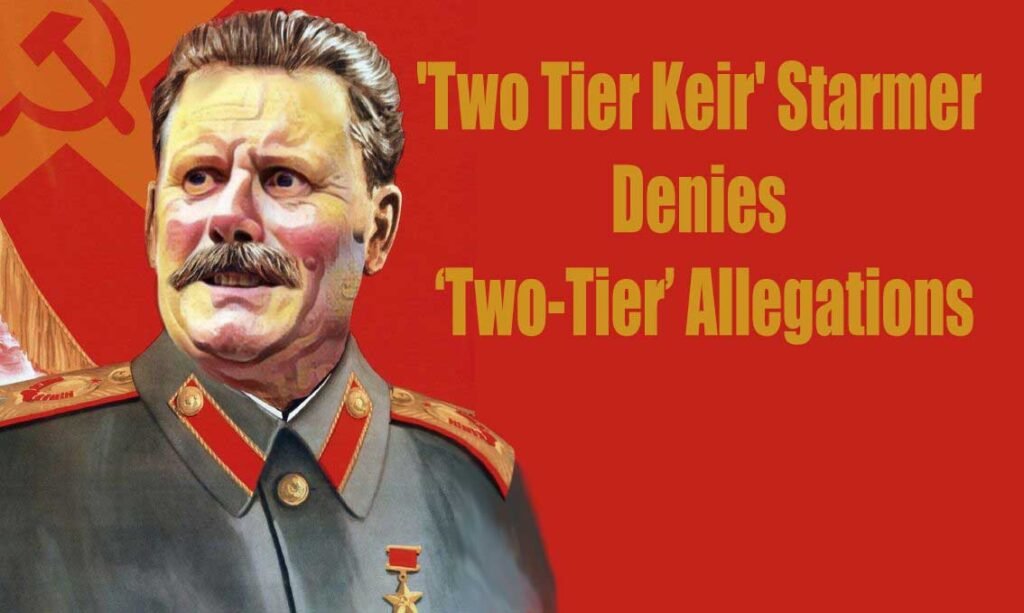
LONDON—Labour leader Sir Keir Starmer smoothly deflected accusations of a “two-tier” system within the party at today’s press conference, responding to a pointed question about whether his leadership favours certain groups. Starmer, ever the picture of composure, categorically denied the claims, insisting that Labour remains committed to inclusivity and fairness.
“Labour is, and always has been, a broad church,” Starmer said, with his trademark mix of authority and reassurance. “We welcome all voices, all perspectives, and every policy we pursue is rooted in equality and fairness for all. There’s no truth in the idea of favoritism or division under my leadership. We are a party for everyone, and that’s how we govern.”
The reporters, not fully satisfied, were eager to press further, but before anyone could get another word in, Starmer glanced at his team and, with a polished smile, announced, “Let’s take a brief recess, shall we?”
A collective murmur ran through the room as Starmer stepped away for a break. Reporters exchanged glances, unsure what was coming next. A few whispered that the recess seemed conveniently timed after such a loaded question. But things took an unexpected turn when Starmer returned to the podium, visibly refreshed and with an announcement that left jaws dropping.
“Thank you all for your patience,” Starmer began, smiling broadly. “In light of the importance of maintaining a focused and constructive dialogue, we’ve decided to introduce some changes to how we conduct these press conferences moving forward. I’m pleased to announce that the next press conference will be by invitation only.”
Invitation Only: A New Era of Press Conferences
The words hung in the air as reporters scribbled notes and exchanged surprised looks. Starmer continued, completely at ease, as if this dramatic shift were the most natural thing in the world.
“This will ensure that we can create a space where the conversation remains productive, civil, and forward-looking,” he added. “We value input from all corners, but naturally, we want to prioritize those voices contributing most meaningfully to the conversation.”
Then came the kicker: “And to further incentivize thoughtful questions, we’ll be rewarding the best contributions with invitations to join me at my upcoming supper Club. These exclusive events will allow for more intimate discussions—an opportunity to really dive deep into the issues over dinner with those we can trust.”
Caviar for Queries, Crumbs for Critics
The room went from confusion to quiet disbelief. While many in the front rows—those who typically asked the more polite, policy-oriented questions—perked up at the mention of an exclusive supper club, those seated toward the back, known for their more populist or hard-left leanings, looked less enthusiastic. As if on cue, staff members discreetly began handing out glossy invitations to a select few reporters. Unsurprisingly, the invitations seemed to go to those who had previously lobbed more… favorable questions.
One journalist from a populist paper raised an eyebrow and whispered, “I’m guessing they ran out of invitations before they got to us.”
Another leaned over and added, “Forget two tiers—this is looking more like a tasting menu for those who ask about electric buses instead of illegal imigration.”
An All-Inclusive Church with a Select Guest List
As Starmer continued fielding questions—now from the more visibly delighted invitees—the divisions in the room grew more obvious. The leader’s “broad church” rhetoric seemed somewhat at odds with the exclusive nature of the new arrangement. Nonetheless, Starmer reiterated Labour’s commitment to inclusivity, even as some journalists found themselves metaphorically (and possibly soon, literally) standing outside.
“Labour is committed to hearing all voices,” Starmer declared, raising his arms slightly in a statesman-like gesture, “but we also recognize that certain discussions require a more refined setting to really get into the details. Starmers Supper Club will allow us to have those crucial conversations—over excellent food, with a more relaxed congenial atmosphere.”
The reporters at the back—who had yet to see a single invitation—couldn’t help but laugh quietly. One muttered, “I guess I should’ve asked about the wine pairing instead of the two-tier legal system.”
Press Freedom, But with Perks
As the press conference wound down, Starmer took a few final questions from those in the center of the room, mostly touching on safe topics like green energy and economic recovery. The reporters who had received their golden invitations appeared smug, while others lingered, wondering whether they’d ever get a chance to ask their burning questions again—or whether they should prepare for a life of reporting from the fringes.
“Well, it seems some of us will be getting steak,” quipped one hard-left journalist as they packed up, “while the rest of us make do with the crumbs of democracy.”
Starmer closed the session by once again thanking everyone for their participation. “We value every voice, and I look forward to continuing these important conversations—especially with those of you who’ll be joining me at my supper club.
“What’s next,” one disillusioned reporter whispered, “journalism being outlawed altogether and only propagandists allowed into the ‘club’? At this rate, we’ll be off to the Gulag or the firing squad soon.
